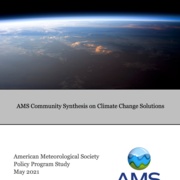Executive Summary
Scientific discovery and innovation are central to the advancement of humanity. This is even more true now as the scale of human activities have grown to be large relative to the planet and the life-support services the Earth system provides.
After decades of intensive scientific research, a great deal is understood about the climate system and the impact people are having on it. Scientific evidence relating to climate change spans dozens of fields of study and includes work from tens of thousands of individual scientists. The evidence has been rigorously assessed and independently corroborated hundreds of times. Many climate change solutions are already well understood, fully developed, and available for implementation. Nevertheless, humanity has been largely ineffective in addressing climate change.
This AMS Policy Program study provides a summary of input from the AMS community on climate change solutions. It was carried out in an accelerated time frame in response to a request from the National Science Foundation for rapid community input. Through these community discussions, this study identifies six key principles and seven solution areas for emphasis:
Principles:
- Progress is needed in advancing knowledge and understanding and applying knowledge with respect to mitigation (i.e., emissions reduction) and in adaptation (dealing with climate change impacts).
- Broad participation, involving all sectors of society and the vast majority of people, is necessary.
- Inclusion, equity, and justice are critical (these require unity, fairness, trust, and shared visions of success).
- Objective measures of progress are essential.
- Climate change is simultaneously a critical stand-alone problem, inextricably linked with a raft of other societal issues, and symptomatic of larger challenges and opportunities facing humanity.
- Efforts ranging from individual to global scales are needed to address climate change. These efforts must account for what contributions are possible at each particular scale.
Solution areas:
- Develop a comprehensive plan for observations and monitoring
- Enable broadly distributed efforts and public participation (i.e., place-based approaches)
- Tailor scientific assessments for decision-making
- Modernize climate science (i.e., upgrade computing infrastructure, workforce training, scientific practices, and rewards and incentives in research)
- Develop the future workforce (education: informal/K–12, undergraduate/graduate, continuous education)
- Develop effective strategies for public understanding and engagement for all audiences
- Enable and strengthen partnerships
Human-caused climate change is extremely dangerous to all people everywhere. Addressing climate change effectively is challenging for a variety of reasons, including that it is embedded within additional problems and symptomatic of larger challenges facing humanity. However, success in addressing climate change is possible and represents an opportunity for humanity to chart a path forward on a much wider range of challenges and opportunities. Therefore, addressing climate change has the potential to usher in a more prosperous future—one that is more secure, inclusive, equitable, and just and that enables people and all life to thrive.
